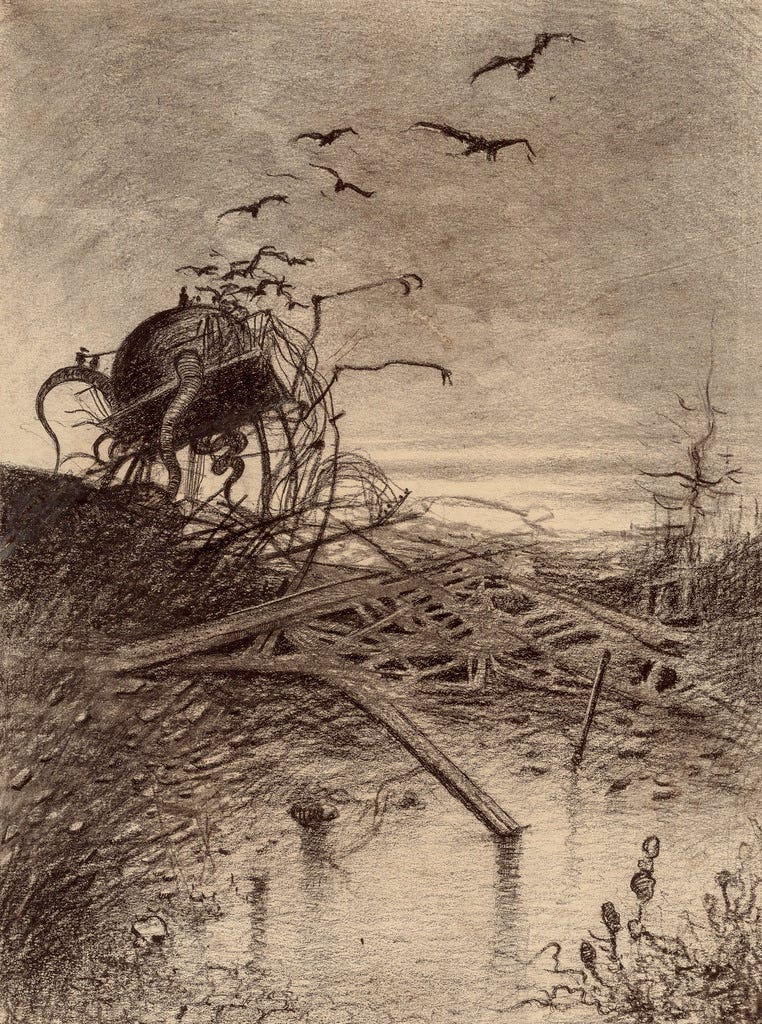THE MARTIAN WAR
So like I mentioned, a novel that I’d sweated over for two years, sweated over like you wouldn’t believe, imploded.
Two years of work and what I had was pretty much junk. Once I realized the dire situation, I spent a couple of months trying to figure if there was anything I could salvage from it, perhaps maybe a short story or, at absolute worse, a page or two, but in the end I came to the incredible realization that there was nothing that could be saved. Like at all.
The book had not only officially coded; it was dead even at the sentence-by-sentence level.
Which, from another perspective, was quite a feat.
Not the first time a book of mine had burned to ash on the fuel of its own wackness, and I suspect it won’t be the last.
Typically when my books die, they stay muerto. There was my novel about a psychic anti-messiah (my very own Caribbean AKIRA) that grinded to an ignominious halt after two superlong chapters—never revivified. There was my Caribbean take on the Dying Earth genre ala Gene Wolf that reached a whopping 400 pages before I realize that I had spent 100 pages describing a journey that I could have summarized in one paragraph—never revivified (I’d even gotten a contract for that one). There was a novel about my first year in Brooklyn circa 1992 centered on all the police brutality organizing I’d been doing at the time, but simultaneously about the young cats in my barely-heated State Street walkup that had concocted some Guitar-level strategies for dealing with the white gentrifier invasion. (The fact that I was a Dominican immigrant gentrifier from NJ didn’t seem to register with anyone.)
There are a few others, but no need to visit every grave in my Cemetery of Libros Perdidos; point is, dead in my writerly universe, was dead. (No afterlife in this cosmology.)
This latest novel felt especially dead to me. Ultradead even. A cenotaph the size of the Pantheon with no doors. In all the mentioned past cases I tended to mope for a month or two and then get back at it, but this one was different. I stayed upset at it. Couldn’t so much as think about the book without wanting to print out the manuscript again and burn it.
The book was set on an other-dimensional Mars and you know how certain folks can’t even hear Trump’s name without frothing at the mouth? That was me and Mars. And any friend fool-hardy enough to mention the novel – How’s that going? – were in for a hard glare or, if I was feeling particular quillao, a long diatribe on what a bullshit piece of crap that whole thing had been. I remember once finding a discarded print-out of a chapter in the back seat of my car and going straight Sabertooth1 on it – Iron Mountain shredders had nothing on me.
Stranger still for four, five months afterward, I found I couldn’t so much as look at fiction. Read it or write it. It was as though bookfail had blown whatever fiction circuits I had in me, some weird literary collateral damage. Thank the ancestors I didn’t stop reading – nothing has ever derailed that need / impulse. I tore through a string of recent histories and Duke University Press releases. I wrote a few small things: some book reviews for the New York Times, an essay on Octavia Butler’s Kindred, blurbs for books I enjoyed, letters of recommendation, I prepped my D&D game, I taught. But while the fiction reading aversion wore off, I could not for the life of me write any fiction. Instead I took walks; my standard two hour daily perambulation becoming four hour affairs.
And that’s how the year passed.
In situations like this, one wonders if the fiction will return. I would not be the first writer for whom the gift / calling / curse of writing disappears.
A part of me would have grieved that loss profoundly, but another part of me, I suspect, a weak part of me, might have rejoiced.
But in the end, like the rains in Azua, the writing returned. A short story about shattered immigrants (my favorite genre, I guess). A little scriptwriting that was never picked up.
Most curiously of all, I found myself returning to Mars. Initially in my dreams, where certain characters shared meals with me. But eventually, on days I had nothing to do, I started poking around at the novel’s dreary opening pages. This was no door-kicking head-first Aragorn Returns to Gondor sitch, but more of a tentative rapprochement. Like a patient testing a leg that had been gruesomely shattered.
This resurgence confused the heck out of me, I didn’t know what to make of it at all. A dead book of mine coming back to life? Impossible. But it seemed there was more to my cosmology, Horatio, than I dreamt of.
The book was back in a way and I had a choice; I could let it lie or I could take another run at it. The weak part of me argued for night-night but the part of me that is a writer through and through, that never gives up in a Mets fan sort of way, decided to take the chance.
The odds were not great. Sometimes a little distance can alter your sense of the materials, heighten appreciation, but not in this case. A year in the drawers had not magically improved the manuscript’s endless flaws. It was still fucked up every way but loose. Of the 400 plus pages I’d written, 50 pages might be salvageable with a severe rewrite – and I stress: might.
More problematic, I was still mad at the book (which is a curious emotion to have towards something that’s not itself alive). Which was a shitty starting point. Novels are already hard enough to write without a pall of resentment hanging over the process.
So what to do? Keep it small, for certain. When you got an overwhelming task you have to be like Gilgamesh in Mitchell’s translation: when there’s no way out, just follow the way in front of you.
I’ve also realized that if I wanted to make this work and reach whatever was waiting for me behind this manuscript – this novel or some other – I was going to have to, in Octavia Butler’s words, “re-educate myself, relearn my art, my craft, the thing I love and need most.”
Nothing for it but to start hitting it. To quote Samwise quoting his old gaffer, "It's the job that's never started as takes longest to finish.”
Blessedly I wasn’t alone. I’ve been a writer for over 3 decades, had published three books, so I had those muscles and habits to depend on. Plus I had three simplicities that have always guided me. The first of these simplicities was, for me, the easiest, and the one that keeps writing alive: of course I’m talking about reading. Whether you’re a beginner writer or a veteran the best way to write is to read. I had read literature again. Took a couple of weeks to spin up to speed but soon enough I was back to reading a book of literature every two, three days.
The other two simplicities are straight-forward exercises that I used in my advanced writing workshops.
More on those in the next post (most of which will for be paid subscribers).
Sabertooth from X-Men.




I remember years ago, at a B&N reading in Manhattan, you said something along the lines of: I'm sorry but I have to read this piece out loud. It was something you'd been working on that had to do with aliens, and some crazy space shit. Lasers were involved. You apologized (profusely) and said you couldn't know if the thing was good until you'd read it to an audience. When you finished, you apologized some more, and shoved it back in your pocket. I wanna say this was back in 2008? At the time, I was like, Welp! If anybody can pull it off, its Junot Diaz!
I still think that. Maybe it's not you, maybe the piece isn't ready for the world (and other woo-woo stuff like that).
A couple years before I went to your reading, i got a really hot agent named Andrew Wylie. I'd just finished my first book. He was like: It's a hit! We'll go to the Frankfurt bookfair, we'll sell a bunch of copies; you're gonna be a star!
We sent the book out to something like 30 publishers, and it never took. Nobody wanted to touch it. Everybody had different reasons as to why. I worked on that thing for 14 more years (!). I burned through 3 subsequent agents (!!!!). Great ones too. I couldn't give the idea up. Couldn't get it out of my head. I dreamt it, slept it, breathed it. And made it worse with all my tinkering.
Last year I finally kicked it to the curb--and it felt good. Really good. Because it made room for something else. I don't know what that something is yet, I'm working on it, we'll see. But letting go (truly, deeply) is the hardest, and, paradoxically, most freeing feeling (sometimes).
I imagine this endeavor (substack) will help show you the way.
Thank you for being brave and sharing the process. I look forward to seeing your thoughts in the weeks and months ahead!
All my best,
Dave
I always wanted to ask a writer with prestige the following: What happens when you show your work you think es una mierda pinchada en un palo to others? Do they praise it anyway based on prior awards or brilliant works? Ellos tienen pelos en la lengua? Does it become easier or harder to tell if you created something worthy once you’re “in”?